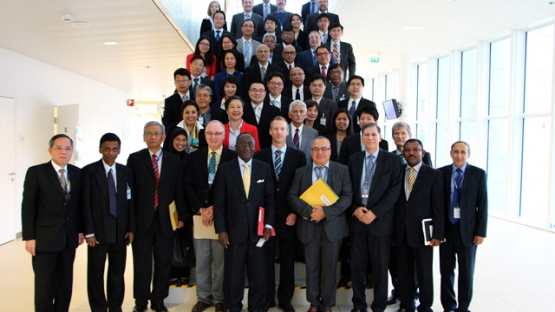Over 60 representatives from the Asia and Pacific region as well as the Regional Co-operative Agreement for Research, Development and Training Related to Nuclear Science and Technology for Asia and the Pacific (RCA) Regional Office and IAEA staff gathered in Vienna, Austria, on 19 September, to review policy and management issues related to the RCA. The implementation of on-going RCA projects and the design of RCA projects for 2016-2017 were reviewed, and discussions on the necessary measures to further enhance the effectiveness and efficiency of this cooperative mechanism took place.
Fiji has been warmly welcomed as a new party to the RCA since 25 August 2014, which increases the number of the current RCA parties to 21.
In his opening address to the participants, Mr Kwaku Aning, IAEA Deputy Director General and Head of the Department of Technical Cooperation, commended the many achievements made under the RCA in such vital regional socioeconomic development areas such as health care, food and agriculture, industrial applications and environmental protection. The achievements demonstrate that RCA States Parties have been paying great attention to mobilizing all possible means and opportunities to further improve all stages of the cooperative programme, from strategic planning through formulation of the programme/projects to implementation, monitoring and the final assessment. Mr Aning confirmed the IAEA's full collaboration and the strong commitment of the Department of Technical Cooperation to continue fulfilling its obligations under the RCA Agreement.
Reports from the meeting demonstrated that the follow-up activities, which were recommended at the RCA National Representatives Meeting (NRM) in April 2014, New Zealand, have been fully completed. Planned events under on-going projects have been and are being well-implemented in line with work plans. The number of project concepts for the RCA programme for 2016-2017, as well as the priority of each concept, were discussed and agreed upon for the development of project design, emphasizing the necessary measures to ensure high quality project designs.
Other substantial matters addressed at this event included the progress made by the Working Group on the Preparation of the RCA Medium Term Strategy and Strategic Priorities 2018-2023, the Working Group on Proposed Amendments of the RCA Agreement, the Working Group to Consider the Future Role of the RCA Regional Office, and also agreement on follow-up activities of each Working Group up until the 37th RCA National Representative Meeting, which will be held in March 2015, Pakistan.
Background:
The Regional Cooperative Agreement for Research, Development and Training Related to Nuclear Science and Technology for Asia and the Pacific (RCA) is an intergovernmental agreement among the IAEA Member States that are located in South Asia, South East Asia and the Pacific, and the Far East.
It was first established in 1972 under the auspices of the IAEA, to promote, coordinate and implement cooperative research, development and training projects in the peaceful application of nuclear science and technology amongst the parties to the RCA.
Currently, there are 21 parties to the RCA, namely: Australia, Bangladesh, Cambodia, China, Fiji, India, Indonesia, Japan, Republic of Korea, Malaysia, Mongolia, Myanmar, Nepal, New Zealand, Pakistan, Palau, Philippines, Singapore, Sri Lanka, Thailand and Viet Nam.
Further information on the activities of the RCA can be obtained by visiting the RCA website, which is hosted by the RCA Regional Office located in the Republic of Korea.


